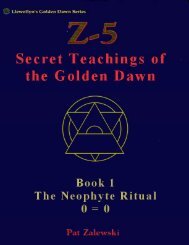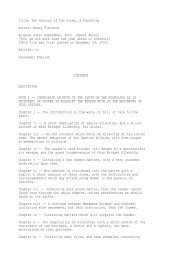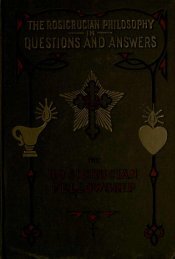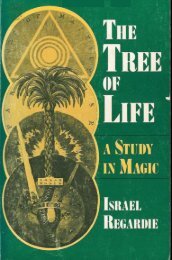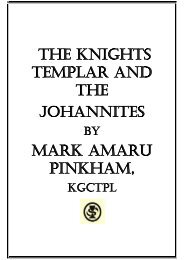Click to download PDF version: 3.87MB - Global Grey
Click to download PDF version: 3.87MB - Global Grey
Click to download PDF version: 3.87MB - Global Grey
Create successful ePaper yourself
Turn your PDF publications into a flip-book with our unique Google optimized e-Paper software.
82 At the Back of the Black Man's Mind By R. E. Dennett<br />
Ci and Kici. These three elements of the trinity appear in Bavili philosophy as Xi, Ci, and<br />
Fu. (It is desirable <strong>to</strong> note Xi and Ci are respectively female and male, whereas Nzambi<br />
Mpungu and Nzambi Ci are male and female.)<br />
Xi means passive matter or things pertaining <strong>to</strong> the maternal principle. Ci is the paternal<br />
or active principle.<br />
Let us take an example. The sea is regarded as a male principle; from it proceeds rain<br />
which falls on the earth, and the earth is regarded as a female or passive principle; the<br />
rain fertilises the earth and causes it <strong>to</strong> bring forth fruits.<br />
Fu is, properly speaking, habit, cus<strong>to</strong>m, or sequence; we may, perhaps, express it in one<br />
word by evolution, understanding thereby rather the process by which the individual is<br />
produced than the life his<strong>to</strong>ry of a species. In another sense it may almost be said <strong>to</strong> be<br />
the individual himself. Thus, when the rain has fallen upon the earth, it forms on the one<br />
hand springs and rivers, and on the other causes vegetation <strong>to</strong> spring up. Both the rivers<br />
and the vegetation result from the interaction of earth and sea: the process of<br />
production and the product are both Fu.<br />
In order <strong>to</strong> prevent misconception I expressly state that these ideas are not derived<br />
directly from the natives, but from philological considerations. These three ideas are<br />
naturally strictly abstract and out of all relation with the material universe.<br />
Xi and Ci having produced Fu cease <strong>to</strong> operate; Fu, on the other hand, continues. Under<br />
the name Vu it becomes active in space and time, and may be called the cause of the<br />
material universe, Vu=time, season.<br />
TEMPORAL IDEAS.<br />
(a) The Divisions of the Year.<br />
Properly speaking, the year falls in<strong>to</strong> three divisions, Mawalala, Xicifu and Mvula. Of<br />
these, Mawalala is a period of rest, Xicifu a period of preparation, and Nvula an<br />
evolutionary period or period of production. just as in the cosmological ideas we have a<br />
progression of three fac<strong>to</strong>rs, Xi, Ci and Fu, so in the same way in temporal ideas,<br />
Mawalala and Xicifu produce Nvula. just as Fu in its turn became a cause, so Nvula<br />
produces Mawalala of the succeeding year.<br />
(b) The Seasons and Months.<br />
Of the three divisions of the year, Mawalala is itself both a season and a month; Xicifu<br />
falls in<strong>to</strong> two seasons of two months each, and Nvula in<strong>to</strong> four seasons of two months<br />
each. Properly speaking, the seasons only ex'ist as fac<strong>to</strong>rs in six groups of four, the other<br />
three being in each case the two months, and the product specially associated with the<br />
seasons. These groups of four are related just as our cosmological series, Xi, Ci, Fu, and<br />
Vu; they consist of a principle, male and female causes and a product.<br />
www.globalgrey.co.uk



